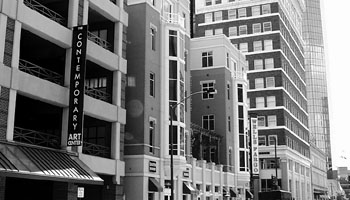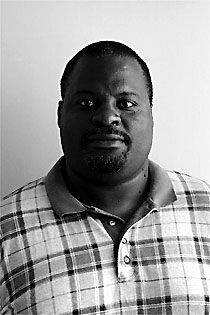By Carey Hix staff reporter Renewing a negotiation process that broke down earlier this summer, TCU officials are hoping to raise an estimated $200,000 to assume operation of the downtown Contemporary Art Center, said Ronald Watson, chairman of the art department. "As of Aug. 24, the chancellor has challenged the International Fine Arts Board of Visitors for the College of Fine Arts and Communications to raise $100,000 by mid-October," Watson said. "If they do that, TCU will match the money." Provost William H. Koehler said he would like to see half of the total amount come from donations.
"We believe that we will dramatically increase the size of our audience, and that this new venue will raise the department's profile significantly in Fort Worth and beyond," Watson said in a statement May 4. "This gallery will also present pedestrians with a living embodiment of TCU downtown; the door will be open and the public will be welcome in the afternoons and evenings." This will allow initiation of the program for a year, after which it will undergo a review to examine the feasibility of the project, Watson said. The acquisition was put on hold this summer after disagreements over lease terms and initial start-up funds arose between university and art center officials. Despite the setbacks, Koehler said he remains optimistic that the barriers will be lifted and things will work out in the long run. Andrea Karnes, a graduate student in art history and a 10-year employee at the Modern Art Museum of Fort Worth, said she would like TCU to acquire the building. "I think it would be great to expand programming and have the additional space," she said. "It would give more exposure to the university's exhibits because of the business and tourism downtown." Karnes said she thinks the center would enhance the established local arts community and have a positive effect. Dan Blagg, the center's president and acting director, said the goal of the center is important to the city, because it is the only venue in town that is dedicated particularly to displaying Texas and local art. Other objectives included a direct contribution to teaching and learning by exhibiting contemporary works of art downtown, hosting a variety of TCU courses and providing research opportunities for art and art history students, he said. The center, located in the Gainsco Building, opened in December 1996 as a nonprofit art gallery.
By Kris Gutierrez staff reporter TCU and national fraternity officials are investigating the events surrounding the arrest of a fraternity president after he was taken into custody for buying or providing alcohol to minors at an off-campus party this past weekend. Jeff Moles, president of Pi Kappa Phi fraternity and a resident assistant in Milton Daniel Hall, was arrested early Friday morning after Fort Worth police and Texas Alcoholic Beverage Commission officers broke up a party in the 3200 block of Sandage Avenue, police said. He was taken to Tarrant County Jail and released on $500 bond. Moles could not be reached for comment Monday night. Pi Kapp Vice President Carl Long said chapter officials are still trying to determine what led to Moles' arrest. Although the party was held at a house where two Pi Kapp members live, the party was not an official fraternity function, he said. "I really can't say anything about what happened because I don't have all the information," he said. "There were about 500 people there. I wasn't actually at the party, but if you figure a tenth of the student body was at one party ... it was more of a TCU party." But a student who was at the party said the gathering was organized as an official Pi Kapp function. "I've heard it described that a (fraternity) function is an event when four or more members are present," said the source, who requested anonymity. "The majority of the Pi Kapp chapter was there." When Fort Worth police and TABC officers raided the house shortly after midnight, they searched for the organizer of the party and then arrested Moles, the source said. Minor-in-possession citations were also issued to two Pi Kapp members. "They found whoever's in charge, and he's liable," the source said. TABC investigators could not be reached for comment Monday night. A national Pi Kapp representative said the investigation is underway to find out about Friday morning's incident. "It is too early to say anything," said Tom Atwood, national director of chapter services for Pi Kapp, based in Charlotte, N.C. "We know there was an event this weekend. We know that TABC was at the party and that they acted on it. We know the chapter president was detained, but we do not know the results of local law enforcement actions." Atwood also said detaining chapter presidents is an uncommon practice. Doing so Thursday night was a reflection of TABC's recent commitment to enforce underage drinking laws statewide, he said. An investigation headed by university officials is also underway to determine if the Pi Kapp fraternity will face any disciplinary actions, said Kristen Kirst, director of fraternity and sorority affairs. Those actions can range from a warning to probation, she said. Fort Worth Neighborhood Officer Matt Welch said TABC officers accompanied by Fort Worth officers go to parties where alcohol violations may be occurring or parties that have drawn complaints. "It's their show, so-to-speak." Welch said. "They're the primary ones initiating all this stuff." About 10 citations - unrelated to the party in the 3200 block of Sandage Avenue - were given to TCU students for underage consumption and possession of alcohol this past weekend, Welch said. The tickets were given to students at parties in the 2600 block of Stadium Drive and the 3200 block of Merida. "The school does not discipline the kids," Welch said. "I give a copy of the tickets to the university. They see this as a track record, and if they see a problem, they will probably put them in some kind of alcohol counseling." This action is for the students' benefit, he said. "Every year there's always one or two kids somewhere in the country that gets (drunk), and they wind up dead some place," Welch said. "And they don't want to see that happen at TCU."
By Kris Gutierrez staff reporter In an effort to increase alumni involvement, black alumni are being called back to school to join TCU's first black alumni association. The Black Alumni Alliance, created June 19, will offer social activities, networking and mentoring opportunities and community service projects for black alumni and current students.
"It's definitely a piece in trying to get more alumni of color active in the life of the university," Turner said. "This alliance is the realization of a long-held dream for (black) alumni and students at TCU." Turner said several black alumni have already expressed an interest in the organization. About 80 people attended the inaugural meeting in June, he said. "There is a large number of successful black alumni in the Dallas/Fort Worth area," said Don Graves, a 1987 TCU alumnus who now resides in Plano. "We want students of color to see there are positive role models for them. Our primary objective is to get alumni of color involved in alumni functions as a whole." Alumni Director Kristi Hoban said this type of organization helps improve alumni involvement in general. "It's to our advantage to have groups organized by interest, " she said. "This is just one of many constituent groups that organized their own group." This is the first TCU program where members are grouped together by race, but other universities have been doing so for years, Hoban said. Fraternities and sororities, the School of Education, the Ranch Management Program and the Lettermen's Association have their own alumni associations, she said. Each group has its own boards and bylaws, but they still work together under the TCU alumni umbrella and share the same goals, Hoban said. "The more small groups we have, the better the alumni association will be, " she said. "The development of a black alumni group is part of the five-year plan of the university's national alumni board. We are pleased to be working with this group of alumni to achieve this goal."
By Alan Melson staff reporter A settlement may soon be reached in the lawsuit filed against TCU by the contractor who built the Walsh Center for Performing Arts, a lawyer representing TCU in the matter said last week. Rick G. Sorenson said he is "hopeful" a settlement is close, but would not comment any further on specifics of the lawsuit. Thos. S. Byrne Inc., the firm that built the Walsh Center, filed a lawsuit against TCU on June 18 in the 17th District Court of Tarrant County, claiming that "numerous changes to the original scope of the contract" were made to the architectural plans for the Walsh Center. The lawsuit also claims that these changes required additional work "outside the scope of the original contract." Byrne alleges in the lawsuit that TCU still owes $584,807 for the additional work and has refused to pay after numerous requests. Byrne is suing for that amount in damages. Stephen Harrison, the attorney representing Thos. S. Byrne, declined to comment. In a counterclaim filed by TCU last week, the university claims that during early construction of the Walsh Center, the contractor began asking for compensation exceeding the guaranteed maximum price agreed to in the original contract. The document claims that TCU paid a higher amount to ensure the building's completion. The counterclaim alleges that the extra cost stemmed from "errors and omissions" by the architectural firm, Hardy Holzman Pfeiffer Associates of New York City, who designed the building. The document claims that "professional negligence" was shown by the architect and that TCU is entitled to recover additional money from the architect to pay the additional fees. Sorenson said that the university will continue working toward a settlement. |
| The TCU Daily Skiff © 1998, 1999 Credits |
 TCU hopes to purchase the art center, a 3,000-square foot
street-level exhibition hall at 500 Commerce St., to enhance TCU's capacity
as a cultural educational resource for art enthusiasts and to provide budding
artists and local professionals with an exhibition where they can display
their artwork, officials said.
TCU hopes to purchase the art center, a 3,000-square foot
street-level exhibition hall at 500 Commerce St., to enhance TCU's capacity
as a cultural educational resource for art enthusiasts and to provide budding
artists and local professionals with an exhibition where they can display
their artwork, officials said. Darron Turner, chairman of the Alliance Steering Committee,
director of minority affairs and a 1987 TCU alumnus, said since 1980 there
have been about 56,000 alumni, 750 of which are black. These numbers are
unofficial because students' races were not documented in alumni records
before the 1980s, he said.
Darron Turner, chairman of the Alliance Steering Committee,
director of minority affairs and a 1987 TCU alumnus, said since 1980 there
have been about 56,000 alumni, 750 of which are black. These numbers are
unofficial because students' races were not documented in alumni records
before the 1980s, he said.